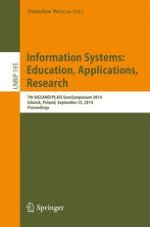This book constitutes the proceedings of the 7th Euro Symposium on Systems Analysis and Design, SIGSAND/PLAIS 2014, held in Gdańsk, Poland, in September 2014.
The objective of this symposium is to promote and develop high-quality research on all issues related to systems analysis and design (SAND). It provides a forum for SAND researchers and practitioners in Europe and beyond to interact, collaborate, and develop their field. The 7 papers were carefully reviewed and selected with an acceptance rate of 40% cover topics in information systems evaluation and education, and they reflect current trends in systems analysis and design.
